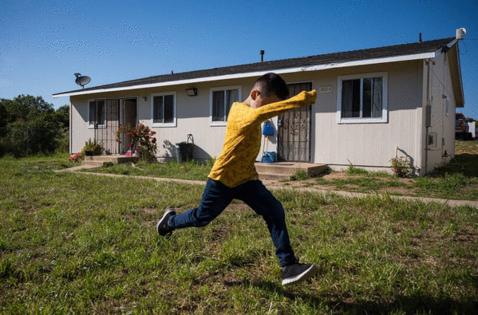California closes thousands of farmworkers' homes annually. New law explores keeping them open
Published in News & Features
SACRAMENTO, Calif. — Thousands of California migrant farmworkers are required to leave their housing annually, leaving units empty for months — but a new law might change that.
Gov. Gavin Newsom signed Assembly Bill 2240 Wednesday afternoon instructing the state to explore keeping its 24 migrant farmworker housing complexes open year-round. These seasonal centers have existed since the 1970s and have continued to operate on the same schedule, even as the needs and demographics of farmworkers have changed significantly.
At a Wednesday press conference in Fresno, Newsom and bill author Assemblyman Joaquin Arambula, D-Fresno, signaled the mandated study was a step in making the centers year-round.
Today, only about 8% of the state’s farmworkers are migrants, according to U.S. Department of Labor data.
“The very nature of migrant farm work has changed so there’s an additional requirement and update needed in that space,” Newsom said at the press conference in Fresno.
Arambula authored AB 2240 following a Sacramento Bee Investigation that found 80% of farmworkers would prefer to stay year-round in the centers. The annual relocations disrupt their children’s education and limit their chances of escaping low-wage work.
California currently operates the centers — which house about 7,000 farmworkers and family members — from about May through November. The complexes then close and remain vacant until the next agricultural work season.
AB 2240 has evolved since Arambula introduced it in February. The bill initially proposed that the centers, owned by the California Department of Housing and Community Development, operate year-round by 2031.
That proposition faced pushback from advocacy organizations and farmworkers from particular housing centers that argued such a change would effectively eliminate the migrant housing program in California. The centers stretch from the Oregon border to Kern County, with local housing authorities, nonprofits and growers’ associations owning the land and managing the centers. HCD subsidizes residents’ rent.
In response to the opposition, the Legislature amended the bill to require HCD to analyze the impact of transitioning the centers to year-round availability by January 1, 2027.
AB 2240 will also now require HCD to update its definition of “migratory agricultural worker,” which residents must meet to live at the center. Per state law, a migrant farmworker is defined as an individual who makes at least 50% of their total income from agricultural employment and lives 50 miles away for at least three months after the housing centers close for the season.
The distance rule was created to ensure those living in migrant housing were truly migratory. Under AB 2240, the rule no longer applies with residents with school age children.
____
©2024 The Sacramento Bee. Visit at sacbee.com. Distributed by Tribune Content Agency, LLC.







Comments